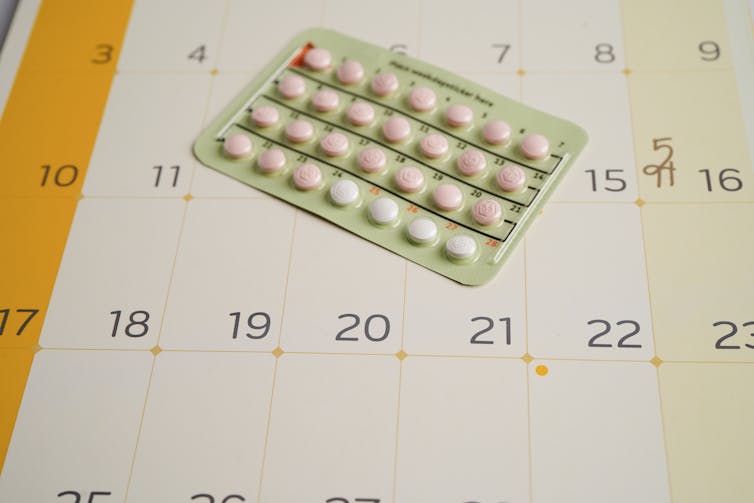
For people with premenstrual dysphoric disorder (PMDD), every month involves a struggle: feeling low and hopeless, navigating a minefield of intrusive thoughts and emotions, feeling so tired and overwhelmed that they are reduced to tears. The symptoms — which can also include depressed mood, anxiety, mood swings, irritability, sleep disturbances, difficulty concentrating and appetite changes — lift when their period starts, only to return again the next month.
PMDD affects one in 20 menstruating women. It shares similarities with premenstrual syndrome (PMS), such as irritability or mood swings, but PMDD is debilitating. It can affect daily function in the luteal phase of the menstrual cycle (the two weeks before a period). During this time, there are fluctuations in the hormones estradiol and progesterone.
PMDD is a hormone-sensitivity condition. Normal hormone changes in the luteal phase can trigger symptoms including suicidal thoughts. This is because PMDD brains respond differently to hormone fluctuations.
PMDD was internationally recognized as a mental health condition in 2019. Awareness of PMDD treatments is still limited. Understanding evidence-based options can help in navigating PMDD treatment.
Table of Contents
Treatments and providers

(Shutterstock)
Depending on symptom complexity, treatment could fall under the purview of general physicians, mental health experts such as psychiatrists or psychologists, or reproductive experts such as gynecologists.
If you suspect you have PMDD, track your symptoms for at least two menstrual cycles. This could also help identify premenstrual exacerbation (PME). In PME, symptoms of other conditions — such as a mood disorder or ADHD — may intensify during the luteal phase. Recognizing symptom patterns can help in finding treatments that work best for your condition.
Treatments that have performed well in quality, randomized controlled trials have the strongest evidence for effectiveness in treating PMDD. They require a prescription so it’s necessary to work with a health-care provider. They include:
Antidepressants
Selective serotonin re-uptake inhibitors (SSRIs) are effective for approximately 60 per cent of PMDD patients. They may help with emotional or psychological symptoms. For some, SSRIs also help with physical symptoms such as bloating or breast tenderness.
The SSRIs fluoxetine, sertraline and paroxetine are first-line treatments for PMDD. These medications reduce symptoms faster in PMDD than in other mood or anxiety disorders. There are several ways to take SSRIs to treat PMDD: taking SSRIs continuously, only during the luteal phase or with the onset of symptoms.
Discuss SSRI dosages with a health-care provider. Trying SSRIs for two to three menstrual cycles is ideal to gauge effects in reducing symptoms. If SSRIs do not work, serotonin-norpinephrine re-uptake inhibitors (SNRIs) could be another antidepressant option. But SNRIs include a higher risk of side effects, so be sure discuss this with a provider.
Birth control pills

(Shutterstock)
Most oral contraceptive (birth control) pills are not effective to treat PMDD because taking hormone pills for 21 days and switching to sugar pills for seven days creates hormone fluctuations that can trigger PMDD symptoms.
However, a specific type — drospirenone-containing oral contraceptive pills (DCOCs) — can help reduce PMDD symptoms. Dropsirenone is a unique synthetic progestin that is not found in other birth control pills.
Taking DCOCs continuously (skipping sugar pills) or following a 24-4 regimen (24 days of hormone and four days of sugar pills) is recommended for PMDD. This regimen helps suppress ovulation better and eliminates hormone fluctuations seen in the luteal phase. It reduces the chances of a negative brain response to hormone changes.
Examples of DCOCs include the brands Yaz, Angeliq, Beyaz, Gianvi, Loryna, Nikki, Ocella, Syeda, Vestura, Yaela, Yasmin, Zarah. Yaz is approved by the U.S. Food and Drug Administration for PMDD treatment.
Other treatment options
Gonadotropin-releasing hormone analogues (GnRHa, aka chemical menopause) creates a temporary, reversible menopausal state. It prevents the release of hormones that trigger ovulation. This in turn eliminates hormone fluctuations that trigger PMDD symptoms.
Hormone replacement therapy (HRT) using ethinyl estradiol and synthetic progestin is often used with GnRHa treatment to reduce side effects such as hot flashes, night sweats and loss of bone density. It helps preserve heart and brain health. Introducing HRT may lead to an initial resurgence of PMDD symptoms, but these often subside once hormone levels are stable.
Accessing GnRHa and HRT can be difficult due to limited expertise. Using GnRHa beyond six months is a new treatment and needs supervision from a gynecologist, or sometimes a psychiatrist with expertise in reproductive mental health. If doctors are unsure about prescribing long-term GnRHa, there are provider-specific resources. It can help start the discussion around GnRHa treatment.
Ovary removal with or without hysterectomy (surgical menopause) is a last-line treatment for PMDD. This is a surgical procedure that removes ovaries and fallopian tubes, or ovaries, fallopian tubes and the uterus. It is invasive and irreversible. It also requires replacing hormones via HRT.
Many women with PMDD are intolerant to progesterone. Removal of the uterus can help some to stay on estrogen-only HRT. Patients would need to discuss these possibilities with a gynecologist. Consider surgical menopause only if all other treatments have failed to reduce PMDD symptoms.
Potential treatments needing more research

(Shutterstock)
Some people with PMDD do not experience relief with SSRIs or DCOCs. There are other medical options that show promise for PMDD symptoms, but they need more research to understand their effectiveness.
The use of 5a-reductase inhibitors such as dutasteride and finasteride can help. They prevent the formation and flux of progesterone metabolites in the brain. They are approved to treat conditions like benign prostatic hyperplasia in men, but are an “off-label” treatment for PMDD. Only a few providers may be willing to prescribe 5a-reductase inhibitors for PMDD as it can cause adverse effects.
Mood stabilizers such as quetiapine in the luteal phase along with an SSRI can help PMDD, especially for those who did not benefit from taking only SSRIs.
Taking continuous estradiol plus progesterone is another option. This treatment uses natural formulations of estradiol and progesterone that are less potent than synthetic birth control pills.
This means that ovulation suppression may be inconsistent and dosages would need adjustments. If ovulation is not suppressed, it could trigger PMDD symptoms, so patients need careful monitoring and supervision from a health-care provider.
Non-medical treatments
Cognitive behavioural therapy (CBT) and dialectical behavioral therapy (DBT) can help with PMDD symptoms. They involve learning techniques to manage thoughts and emotions. DBT can also help cope with strong emotions and suicidal thoughts.
Additionally, self-care skills can lay the foundation for healthy habits. This includes lifestyle changes like maintaining sleep health and adopting physical activity.
Ensuring adequate rest during premenstrual weeks helps manage symptoms. Reducing alcohol use, managing stress and eating a balanced diet can also help in managing symptoms.
Anecdotally, some PMDD patients swear by supplements but more research is needed to understand their effectiveness. For example, PMDD symptoms may improve when using vitex agnus castus. But effects of using calcium carbonate and vitamin B6 for PMDD are unclear.
Supplement intake is risky because they are not well-regulated. Talking to a health-care provider will help in addressing unique health situations.
Challenges in identifying treatment options
PMDD symptoms are unique to each person. Tracking symptoms while trying new treatments can help shed light on how treatment is affecting PMDD symptoms. Likewise, tracking symptoms while making lifestyle changes can show which ones are helping.
Because PMDD was only recently recognized, many health-care providers may also be new to understanding PMDD and its treatment. PMDD treatment needs to be a partnership between the provider and the patient, each learning from the other.
For more information, please refer to “PMDD Treatment Options: A Patient’s Guide to Evidence-Based Treatment for Premenstrual Dysphoric Disorder”, published by the International Association for Premenstrual Disorders (IAPMD).
![]()
Dr. Sneha Chenji is an independent contractor with the International Association for Premenstrual Disorders (IAPMD). She was an editor for IAPMD’s e-book titled “PMDD Treatment Options: A Patient’s Guide to Treatment for Premenstrual Dysphoric Disorder”.























